|
|
|
Sort Order |
|
|
|
Items / Page
|
|
|
|
|
|
|
| Srl | Item |
| 1 |
ID:
131682
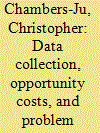

|
|
|
| 2 |
ID:
109909
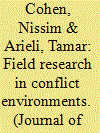

|
|
|
|
|
| Publication |
2011.
|
| Summary/Abstract |
Conducting research in conflict environments is a challenge, given their complexity and common attitudes of distrust and suspicion. Yet, conflict and methodology are usually analyzed as separate fields of interest. Methodological aspects of field work in conflict environments have not been systematically analyzed. This article addresses the central methodological problems of research conducted in conflict environments. We suggest the use of the snowball sampling method (hereafter, SSM) as an answer to these challenges. The effectiveness of this method has been recognized as significant in a variety of cases, mainly regarding marginalized populations. We claim that in conflict environments, the entire population is marginalized to some degree, making it 'hidden' from and 'hard to reach' for the outsider researcher. The marginalization explains why it is difficult to locate, access and enlist the cooperation of the research populations, which in a non-conflict context would not have been difficult to do. SSM directly addresses the fears and mistrust common to the conflict environment and increases the likelihood of trusting the researcher by introduction through a trusted social network. We demonstrate how careful use of SSM as a 'second best' but still valuable methodology can help generate cooperation. Therefore, the evaluation of SSM, its advantages and limitations in implementation in conflict environments can be an important contribution to the methodological training of researchers. In addition to its effectiveness under conditions of conflict, SSM may, in some cases, actually make the difference between research conducted under constrained conditions and research not conducted at all. Together with our experiences in the field, we supply several insights and recommendations for optimizing the use of SSM in a conflict environment.
|
|
|
|
|
|
|
|
|
|
|
|
|
|
|
|
| 3 |
ID:
134108
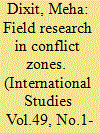

|
|
|
|
|
| Publication |
2012.
|
| Summary/Abstract |
This paper focuses on conducting research in conflict or post-conflict areas and dilemmas faced by researchers when visiting these places. It outlines some of the practical, methodological, normative and ethical issues that may engulf a researcher's mind prior to or while visiting these areas. These include access to the conflict zone, the insider/outsider debate, the feasibility of interviewing civilians and armed combatants, informed consent of the locals, the importance of the socio-cultural context, distinction between victims and perpetrators of violence, assessing trauma in conflict and post-conflict zones, and expectations of the locals. The attempt to highlight these issues does not imply that these are the only questions of concern while conducting research in conflict or post-conflict zones. However, these issues relate to the experiences of the author while travelling to such areas.
|
|
|
|
|
|
|
|
|
|
|
|
|
|
|
|
| 4 |
ID:
092542
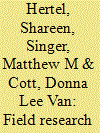

|
|
|
|
|
| Publication |
2009.
|
| Summary/Abstract |
The availability of relatively reliable and comparable data online and the increasing emphasis on statistical and formal research methods has led many political scientists to dismiss research in foreign countries as a waste of time and money. We leave that debate to others (see, e.g., Comparative Politics Organized Section 2005; Qualitative Methods Organized Section 2004). Instead, we offer suggestions for maximizing the contributions of fieldwork to the production of original research. We pay particular attention to research in developing countries owing to the unique challenges of undertaking research there, but we believe our insights are applicable to field research more generally.
|
|
|
|
|
|
|
|
|
|
|
|
|
|
|
|
| 5 |
ID:
091268
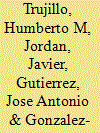

|
|
|
|
|
| Publication |
2009.
|
| Summary/Abstract |
This article has two principal objectives: (1) to study the behavioral dimensions of Muslim prisoners which predict their Islamist radicalism and (2) to study whether the behavior manifested by them is higher in prisons with a greater concentration of Muslims and a higher presence of prisoners convicted for Islamist terrorism than in prisons with fewer Muslims and no convicted Islamist terrorists. We conclude that some Spanish prisons may provide favorable social environments for jihadist radicalism and that the questionnaire utilized is a useful diagnostic tool for evaluating the magnitude of this phenomenon.
|
|
|
|
|
|
|
|
|
|
|
|
|
|
|
|
| 6 |
ID:
150505
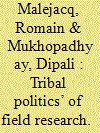

|
|
|
|
|
| Summary/Abstract |
Can fieldwork still be done in today’s most violent warzones? We contend that long-held methodological principles about power and impartiality do not hold in today’s conflict-ridden environments. Research of this kind can still be pursued, but only if the scholar’s place is reconceived as one of limited power and unavoidable partiality. We argue that those still able to do fieldwork in sites of increasing danger do so by virtue of building their own ‘tribes,’ forming and joining different social micro-systems to collect data and, in some cases, survive. Field research must, therefore, be recognized as its own form of foreign intervention. In considering the future of political science research in the most challenging war-torn settings, we examine the risks and opportunities that accompany ‘tribal politics’ of this kind and underline the importance of reflecting on our own positionality in the process of knowledge production.
|
|
|
|
|
|
|
|
|
|
|
|
|
|
|
|
| 7 |
ID:
092550


|
|
|
|
|
| Publication |
2009.
|
| Summary/Abstract |
In 1999, on a trip to Russia to study gender violence, I was sitting in on a special training at a Moscow police academy. In between jokes about the impossibility of prostitutes getting raped, the cops-in-training could not stop focusing on me, the one American and one of three women in a rowdy room. For example, one man loudly asked me whether all Americans had cars and followed up with a comment that, of course we did, because this is where "you" (meaning me) would have sex. The training on rape and sexual harassment that I had come to observe had come to a halt because the new police were so intent on making sexual jokes. These comments felt even more threatening than they might otherwise because, a few days before, I had been picked up by the Russian police, shoved into a police car with several drunken officers, and driven around Moscow until I offered a bribe.
|
|
|
|
|
|
|
|
|
|
|
|
|
|
|
|
| 8 |
ID:
161137


|
|
|
|
|
| Summary/Abstract |
This contribution suggests how to identify and deal with ex-combatants in (un)peaceful post-war environments from a methodological perspective. While it is obvious that large-N studies or standardized interviews fall too short to depict post-war dynamics and related conflict risks, ethnographic methods face numerous challenges, too. First, the identification of and access to former combatants may prove to be difficult. Often being stigmatized or perceived as outlaws they may not wish to get in touch with ‘outsiders’, like academics. Second, researchers need to be careful not to worsen the status of ex-combatants and at the same time make sure to maintain a trustful relationship with the rest of the community. Moreover, certain ethics apply when addressing sensitive war or contemporary issues (e.g. land grabs), even more, if there is a lack of amnesty. I aim at critically discussing questions of trust, legitimacy, networks, the necessity of ‘going local’, as well as logistics that can exacerbate dealing with ex-combatants or even pose a threat to researchers. Before concluding, I briefly delineate dilemmas related to the researcher’s role and her responsibility for field assistants. The article largely draws on my extensive ethnographic fieldwork experience in Cambodia and ethnographic literature on (post-)war settings.
|
|
|
|
|
|
|
|
|
|
|
|
|
|
|
|
|
|
|
|
|